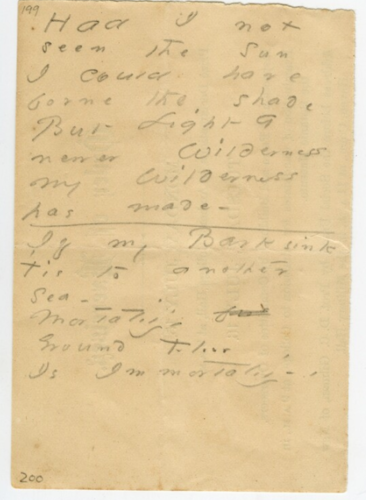
If my Bark sink
‘Tis to another
Sea —
Mortality’s Ground Floor
Is Immortality —Dickinson, F1250A
We are at sea.
So far out that there is no shore to sight. There may be a captain, but it does not matter. The sea is calling the shots. The captain can steer the boat, but the boat is completely dominated by a raging sea.
 I am no sailor, but I know a raging sea, and not just metaphorically. I was a deep sea scallop fisherman to pay for college — 21 miles out on the Continental Shelf off Cape May, New Jersey, in 1978.
I am no sailor, but I know a raging sea, and not just metaphorically. I was a deep sea scallop fisherman to pay for college — 21 miles out on the Continental Shelf off Cape May, New Jersey, in 1978.
In the 20 foot swells, our tiny, wooden boat with a crew of seven was out to sea without the outriggers it used to use for stabilization. As the cook, in my trips to fetch food from the hole, I saw that the boat’s main cross-beaming between the sides of the hull had been deeply cut to accommodate something that had long since been removed.
So when the sea was not gentle, or glassy, our vessel was a bit stressed. There was no head (bathroom) either.
In the rage, the crew did as told in our 10 day trips, working 10 hours on, two hours off, for 24 hours each day (if you were the cook or the captain), and we did not die. I paid off my loan. But it was clear that no captain ever controlled any sea. And that each of us were just at the ground floor of mortality.
These last weeks, we are each on our separate boats heading into a raging sea. We did not make the sea, or the storm, but some — many — hate the captain. The anger is reasonable as we must follow his orders in a time of danger, but the hatred is often hard to fathom.
Could we, any of us, have stopped the storm? Maybe it could have been shorter, maybe fewer would be affected. But in the storm, does blame change the outcome of the storm?
The great thing about about storms is when they are over. If we survive this, and we will, it will be despite any captain, because all captains err. And mutiny is always possible, after we survive the sea.
2000 years ago there was a small, short, intense storm around one person. The storm killed him. But that storm was us. Rather than curse the storm, or the captain in charge of those going through it, he made something happen that changed that and every future storm. Life followed death. Whether literal life or the life of the devotion of those who loved the dead, death did not end life. “’Tis to another sea.” The storm will pass. Things will change, no matter how much they stay the same.
Image credit: Emily Dickinson Archive at Amherst College

COMMENTS
Leave a Reply












